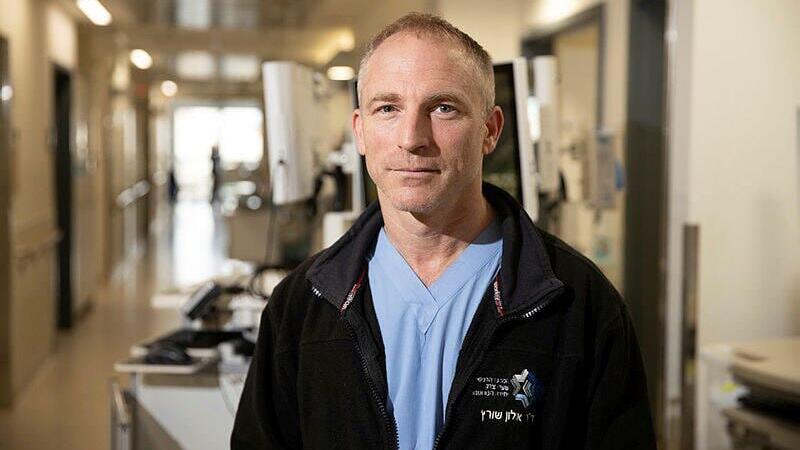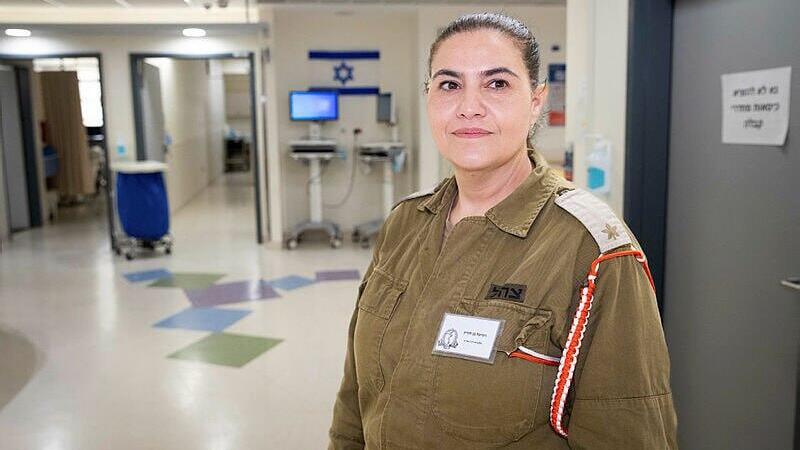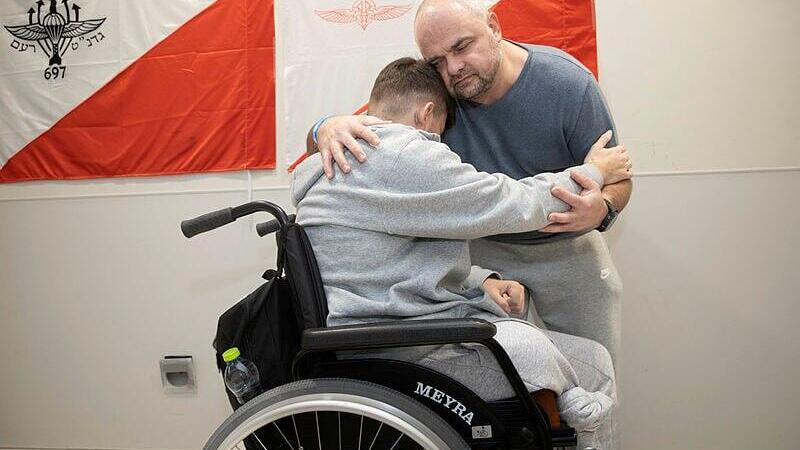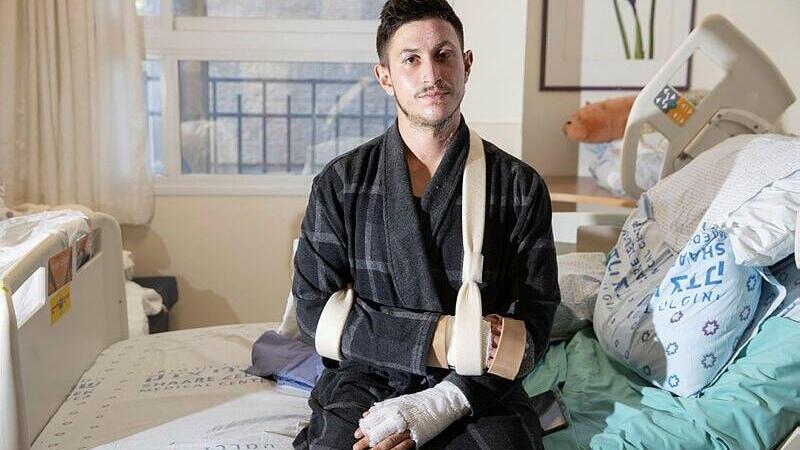Chopper carrying wounded lands near Shaare Zedek Medical Center
(Shaare Zedek Medical Center)
Since the start of the war, there's always been something happening at the Betar Jerusalem training ground in the city’s Bayit Vegan neighborhood – and for the most part, it's had nothing to do with sports. The complex was approved as Shaare Zedek Medical Center's helicopter landing pad, and the wounded are now rushed from there to the hospital, just a 150-second drive away by ambulance.
Read more:
The sound of nearby helicopters makes Major (res.) Revital Ben Horin spring into action. Revital is the Commander of "Ram 2" (military medical services) at Jerusalem’s Shaare Zedek Medical Center and "Mom" to the families of the wounded. Since Oct. 7, she's accompanied hundreds of wounded soldiers, and she's no less astounded by their partners: "They're all heroines, showering and hand-feeding their boyfriends…"
Ben Horin, 42, a Ministry of Education social worker in civilian life, is a religious single mother of a boy a few months shy of three, and a 10-month-old baby. She was called into the hospital on the eve of Oct. 7, "And I've been living here ever since," she says.
"The first images I saw were the wounded from the Nova party, who arrived here on their own or came in Magen David Adom ambulances. There was an atmosphere of tremendous chaos and we were all in total shock."
The reality demanded she pull herself together immediately. In the early hours of the crisis, the Director of the Trauma Unit gave her his personal cell number, and they've been working together since then.
"Even as the helicopter lands, we – the medical teams and Ram 2 – are getting updated and prepared. From the moment the wounded soldier is here, me and my team put all the pieces into place and make sure the patient and his family are not lacking anything. We've witnessed unbelievable stories of heroism, not just of the soldiers but of their families and partners, some of whom are also soldiers, who shower their boyfriends, change their diapers… and that is so not to be taken for granted. Indeed, I asked the army on a number of occasions to give them a break from their service."
One of the wounded, B., 27, injured in the tragedy of the booby-trapped tunnel shaft that exploded near Beit Hanoun, was the last from that incident to be discharged. He lost his leg and on Thursday of last week, left Shaare Zedek for rehabilitation at the Sheba Medical Center. "They saved my life twice here at Shaare Zedek," he recalls, "Once right after I got here, and again after a life-threatening blood infection attacked the amputation area, and I had to have numerous blood infusions."
Only after the initial recovery from complicated surgery was he told of the extent of the tragedy, in which we lost four combat soldiers from Brigade 551 and another four were wounded.
"We went into a mosque knowing beforehand that a shaft had been discovered there and we noticed a camera above it. I was one of the first to go in, and from the blast of the explosives, one of the walls collapsed and fell on me. When the rescue team lifted the wall, I was still conscious and saw that one of my legs was still connected to my body but totally shattered. They evacuated me in a helicopter when I was already semi-conscious and defined as critically injured. But I never closed my eyes because I wanted to stay in control," says B, with his characteristic restraint. Only later would the team tell him just how close he'd been to death.
From Japan to Gaza
The events of that horrific Saturday found B., who'd served as a Class Commander and combat soldier in the elite Duvdevan unit, in the middle of a trip to Japan.
"I bought a very expensive ticket back to Israel and on the way managed to make sure I'd have a helmet, uniform and other gear waiting for me. As soon as I landed, I joined my brigade fighting in Gaza, and to this day my duffle bag remains unpacked! I haven't been home for six months!"
About two weeks before the tragedy in the mosque, B. suffered a neck injury when a Hamas drone detonated a grenade. "We had 13 wounded, including the team commander. The medics were killed and we were left with 11 out of a force of 24."
Before his injuries, B. had been an excellent mountain climber, challenging himself in Nepal, Guatemala and elsewhere, climbing to heights of 5,400 meters and more. "After I get used to the prosthetic – which is really just a good replacement for a foot – of course I'll go back to climbing and I'll also break records in Paralympic sports. And if they'd just let me, I'd go back to Gaza as well," he says.
B. released from hospital after being seriously hurt in Gaza
(Shaare Zedek Medical Center)
"When my Platoon Commander came to visit, I asked him about the other guys, and when he told me four had been killed, I took it hard. Each of them was a father. Even though we hadn't known each other beforehand, we bonded. We fought together side by side 24/7 and we were comrades in arms. I asked myself why it was me who was saved."
Since the beginning of the war, Shaare Zedek has treated about 550 wounded soldiers, mostly with injuries to the limbs and the remainder with burns. In all his time as Director of the Trauma Unit at Shaare Zedek Medical Center (2007-2019), including the Second Intifada, Prof. Ofer Merin, now the hospital’s current Director-General, says he never saw such a large number of wounded admitted in such a short amount of time.
Prof. Merin, an IDF Colonel and Field Hospital Commander in the reserves, was leading an Israeli rescue team in Armenia on October 7. As soon as he heard what was happening in Israel, he was on a plane back home. "I knew it was extremely serious and I got straight on a plane to Cyprus that flew over Iran and Iraq. I was tense the whole flight and by that evening I was already in the hospital."
You also volunteer in the World Health Organization (WHO) and serve as a mentor on their behalf for field hospitals worldwide. Were you disappointed by their reaction to Israel?"
"On a political level, they'll deny the presence of any weapons in Gazan hospitals. But on a personal level, they did call me to ask what was going on."
The war caught the health system lacking resources. How can we improve the situation?
"Our health system operates without reserves and it's totally saturated. And the big paradox is that Israel helps any country hit by catastrophe. That's also our powerful message to the world in relation to the war – our culture is rooted in compassion and humanity. We have to find the balance between treating patients and investing resources in rehabilitation, purchasing advanced prosthetics and – no less important – providing mental and emotional health care."
"Mom. Get Here Whenever You Can.”
Dr. Alon Schwartz, Head of Shaare Zedek's Trauma Unit, and his team, are credited with the many success stories of injured soldiers now in rehab. "Every day, our Trauma Unit is treating Israeli heroes, soldiers arriving straight from the fighting in Gaza and other areas. We are astounded by their emotional strength and that of their families and we draw our strength and inspiration from them, to give them the most dedicated treatment and care we possibly can."
One of those who needed life-saving attention was First Lieutenant Ron, a Deputy Company Commander in a Combat Engineering unit, who recently celebrated his 24th birthday in the hospital. Three weeks ago, he was wounded in a battle north of Shujayia.
"We were just having a coffee break. They tried to ambush our armored vehicle and hit us with an anti-tank missile from close range with unbelievable force."
4 View gallery


Dr. Alon Schwartz head of trauma at Shaare Zedek Medical Center
(Photo: Alex Kolomoisky )
The soldiers' protective gear saved their lives, with ceramic vests absorbing the brunt of the shrapnel.
"I saw two magazines flying out of my vest, just from the force of the explosion."
Commander Ron and the driver, sitting up front, were hit the hardest. The others were lightly wounded.
"We got out of the vehicle and moved into a relatively safe area, while I checked where each member of my team was, and then the shooting began. Whoever could hold a gun started firing. I also tried to shoot but I just couldn't."
The impact of the missile had damaged the muscles in his right hand, which was temporarily paralyzed. His left hand was burned, he caught shrapnel in his knee and half his face was covered with burns. Seven soldiers were carried away in a Hummer, and from there, airlifted in a helicopter to Shaare Zedek: "When we landed, I told myself that I’d arrived somewhere where I knew I’d be taken care of."
He was brought into the Trauma Room where Ram 2 representatives were waiting. "I asked them for a phone and called my Mom. I asked how she was, we talked about all sorts of things. A few minutes later, I told her I was okay, lightly wounded and hospitalized at Shaare Zedek. At the end of the sentence, I calmed her down, saying, "Get here whenever you can,” he says.
"When I get to rehab, most of the work will be restoring function to my right hand, and I also want to overcome the damage to my hearing and the ringing in my ears." His commanders and friends remained with him throughout. “I miss them all”, he says.
And just like B who lost his leg, Ron says that there is no doubt in his mind that as soon as he recovers and if he’s allowed, he’ll be back fighting in Gaza.






